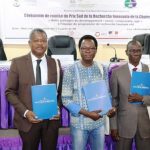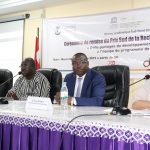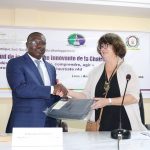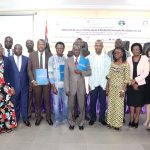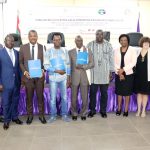Prix Sud 2019
A research project on decent work mobilizes research teams from four universities of three countries: University Joseph Ki-Zerbo (Burkina Faso), University Norbert Zongo (Burkina Faso), University of Lausanne (Switzerland), and University of Lomé (Togo)
On October 1st, 2019, the r4d project “Adapting and strengthening educational guidance and career counseling to promote decent work in two West-African countries: Burkina Faso and Togo”, fitting into the Swiss Programme for Research on Global Issues for Development – r4d financed by the Swiss National Science Foundation and the Swiss Agency for Development and Cooperation, and that brings together four research teams from University Joseph Ki-Zerbo (Burkina Faso), University Norbert Zongo (Burkina Faso), University of Lausanne (Switzerland), and University of Lomé (Togo) for four years (2018 -2022), won the Prix Sud 2019 awarded by the UNESCO chair scientific council. This award, which rewards research teams in emerging countries that develop original and innovative research, was delivered to the r4d team on December 4, 2019 at the University of Lomé.
Here is a summary of the project:
Decent work is crucial for an individual’s life development and well-being. This was defined by the International Labor Conference in 1999 and decent work was made an explicit goal in the United Nations’ 2030 Agenda for Sustainable Development. In the field of vocational psychology, the psychology of working theory posits that both contextual and individual factors have an impact on individual career paths and thus on people’s ability to access decent work. This theory also suggests that appropriate educational guidance and career counseling can support access to decent work and sustain well-being. While employment agencies and career counseling services in most industrialized countries help individuals deal with career and unemployment issues, this has not been the case in low-income countries such as Burkina Faso and Togo, characterized by a very young labor force employed in majority by the informal sector. Combining entrepreneurship training with appropriate educational guidance and career counseling interventions would help unemployed and support the economic development of these countries. Such training and interventions could be designed for young adults preparing for a school-to-work transition and for adults managing career transitions. The project in Burkina Faso and Togo includes five research objectives: (1) describe the educational system and evaluate how it takes into account the needs of the users, the economy, and the labor market, (2) describe educational guidance and career counseling resources and assess their adequacy in regards to the needs of the population in Burkina Faso and Togo, (3) evaluate how the psychology of working theory and the entrepreneurial intentions model in West Africa might have to be adapted for the West African context and thereafter assess and validate adapted models, (4) develop adapted educational guidance and career counseling interventions, and entrepreneurship training, and (5) communicate our results to policymakers and make our interventions available to practitioners.

